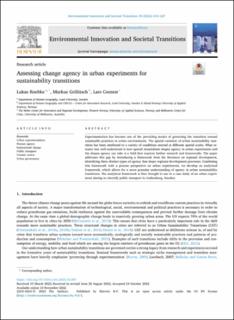Assessing change agency in urban experiments for sustainability transitions
Peer reviewed, Journal article
Published version
Permanent lenke
https://hdl.handle.net/11250/3054553Utgivelsesdato
2022-10-24Metadata
Vis full innførselSamlinger
Originalversjon
Environmental Innovation and Societal Transitions. 2022, 45 214-227. 10.1016/j.eist.2022.10.007Sammendrag
Experimentation has become one of the prevailing modes of governing the transition toward sustainable practices in urban environments. The spatial variation of urban sustainability transition has been attributed to a variety of conditions erected at different spatial scales. What remains less well-understood is how spatial situatedness shapes agency in urban experiments and the shapes agency can take is a field that requires further research and frameworks. The paper addresses this gap by introducing a framework from the literature on regional development, identifying three distinct types of agency that shape regional development processes. Combining this framework with a process perspective on urban experiments, we develop an analytical framework, which allows for a more granular understanding of agency in urban sustainability transitions. The analytical framework is then brought to use in a case study of an urban experiment aiming to electrify public transport in Gothenburg, Sweden.

